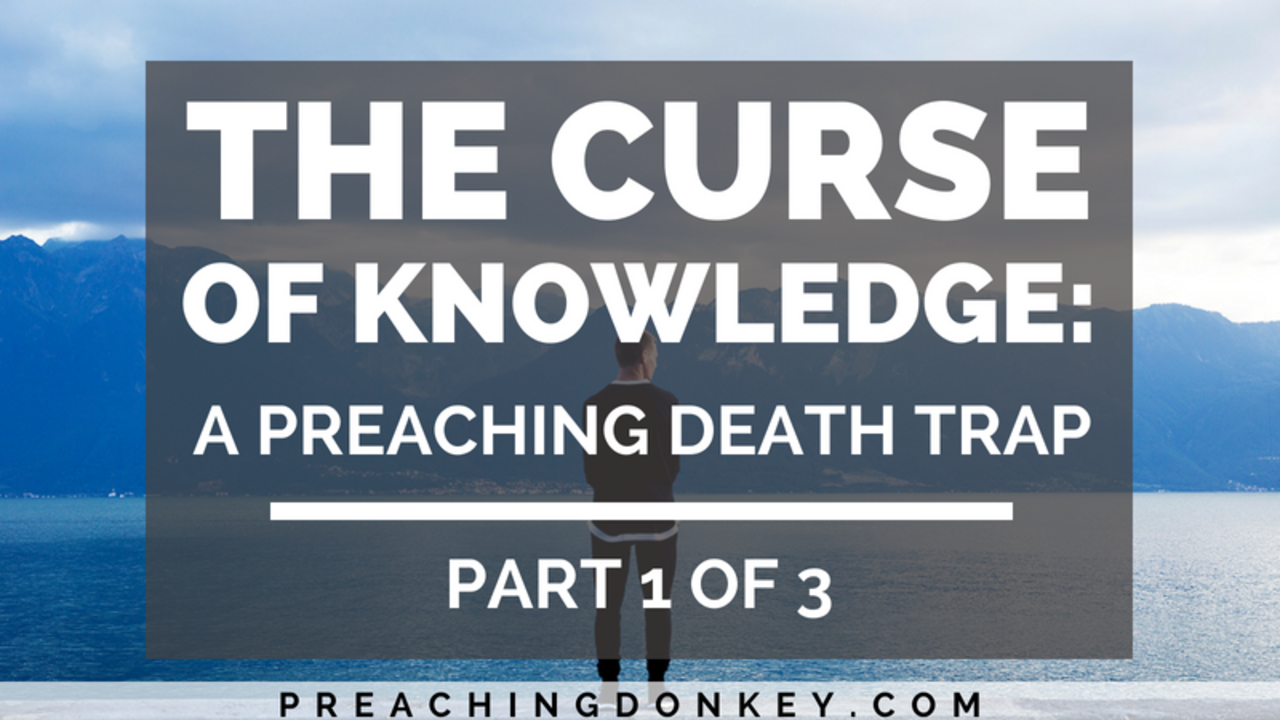The Curse of Knowledge: A Preaching Death Trap – Part 1 of 3

I moved from Oklahoma City, OK to the Washington, DC area straight out of college at 22 years old. It was an adventure to say the least. DC is a fast pace, high capacity, leader-saturated, type-a-personality, beautifully diverse, traffic-jammed, long-commute, action-packed, never-a-dull-moment place to live. I loved it. The people there blew my mind. I met people from all over the globe who were intrinsically driven to succeed in changing the world. It was exhilarating, but at the same time, intimidating. I was a kid from the mid-west who had not seen much of the world (or even the US at that point). I quickly discovered there was a lot I didn’t know. It wasn’t my fault I didn’t know these things, I just didn’t know what I didn’t know.
So I found myself constantly in situations where I would meet someone and we would do the usual, “What do you do?” exchange of pleasantries. I would tell them I was a youth pastor which was my job at the time. They would then tell me what they did for a living. In almost every case for the first few months I would have no idea what they were talking about. They would give me their title or describe what they do but neither would make any sense to me. They would say they were a contractor. I would think construction. But they were not talking construction, they were a defense contractor for the U.S. Government. I was just supposed to know that. Or they were some complicated type of engineer or developer or lobbyist or they worked for a think tank. Think tank? Is that like a dunk tank?
I quickly realized that, in most cases, these roles and positions were common knowledge to everyone but me. It was as if they all got together and learned this stuff and I was left out. I would nod my head and say something like, “Oh, cool, that’s great” But inside I would be thinking, I hope they can’t tell I have no idea what they just said.
I lived in DC for ten years and eventually became one of those people who understands all that stuff. But at first, those conversations left me feeling ignorant which is not a good way to feel about yourself.
What does this have to do with preaching?
Glad you asked! Here’s the thing, there are people in your church every week who have a fraction of the knowledge you have about who God is, what Jesus did, what the Bible is and how to read it, what “sanctification” means, what “salvation” is referring to. When you talk about your “quiet time” they wonder who got in trouble and was apparently sent to time out.
Fact, ideas and concepts that are so common knowledge to you they seem mundane, would blow someone else’s mind. But the problem is many preachers don’t take time to explain complex concepts because they think, “Everyone knows this.” Or worse, “Everyone should know this.” As a result they limit their ability to speak to certain people because they speak over their heads.
Why does it matter that you understand this problem? Every time you preach you run the risk of making people feel stupid just because they don’t know what you’re talking about. When people feel stupid they get insecure. When they’re insecure they close up. When they close up they are not open and willing to hear your message. You. Do. Not. Want. This.
And, not to mention, they probably won’t come back.
The Curse of Knowledge
What I’m referring to is the Curse of Knowledge. According to Wikipedia, it is defined this way:
The curse of knowledge is a cognitive bias that occurs when an individual, communicating with other individuals, unknowingly assumes that the others have the background to understand. For example, in a classroom setting, teachers have difficulty teaching novices because they cannot put themselves in the position of the student.
If you are a seminary trained pastor with vast experience teaching and preaching as I am, you are at prime risk of the curse of knowledge. Think about it, this means we unknowingly assume that others have the background to understand. Pastors do this all the time. So if it’s something we are unaware of, we have to train ourselves to be aware of it. This will help us to stop assuming, because you know what we do when we assume…
In Part 2 of this series we will dive into why we preachers are particularly at risk for the curse of knowledge. But, for now, consider how this has affected you. Consider asking people in your church if they ever don’t quite understand what you’re saying. Ask an unbelieving friend how comfortable she would be in a Bible study where each person is expected to contribute. How has this effected you?


